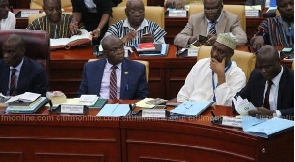The minority National Democratic Congress (NDC) members on the Appointments Committee of Parliament yesterday boycotted the vetting of six deputy ministers-designate.
But despite the boycott, the process went on successfully.
The majority New Patriotic Party (NPP) members on the committee called the bluff of the minority, saying they (minority members) could not use ‘crude tactics’ to stall the work of parliament and slow down the running of government machinery.
The minority leader, Haruna Iddrisu, had indicated on the floor of parliament on Tuesday that the NDC would not be part of any vetting process if leadership decided to extend the process beyond yesterday since the committee needed ample time to write its report to the plenary for approval.
He suggested that the vetting of the other nominees should be deferred to May when the house would return from the Easter recess.
Explaining their boycott of yesterday’s sitting of the committee, a member of the minority side and MP for North Tongu, Samuel Okudzeto Ablakwa, told the media that the NPP majority did not indicate to the minority members that there would be vetting yesterday, and even that given the short notice, the minority thought no proper scrutiny could be done on the nominees.
He said that the vetting process entails a lot of due diligence and that they could not have got enough time to research into the backgrounds of the nominees and also properly peruse through their Curriculum Vitae (CVs) for effective vetting.
He said the process had also been compromised by the majority since notice ought to have been placed in the dailies requesting for memoranda from members of the public on any of the nominees, who were going to be vetted.
“The majority did not properly consult us on this vetting and the process we think is in violation of Articles 79 and 94 of the Constitution,” Mr Okudzeto Ablakwa said, stressing that the minority did not want to be part of any shoddy vetting, which could be an indictment on parliament as an institution.
Untruthful
The majority chief whip and member of the Appointments Committee, Kwasi Ameyaw-Cheremeh, said the minority members were not being truthful to Ghanaians.
According to him, the NDC members were consulted on the extension of the vetting to tomorrow but their argument was that they were tired and therefore could not be part of the vetting which took place yesterday.
He said the excuse given by the minority could only be an attempt to frustrate the government in putting in place its full complement of ministerial appointees to prosecute its agenda as promised in the manifesto of the NPP.
“The minority members should not tell Ghanaians lies because their leader himself on the floor of parliament on Tuesday indicated that they would only participate in yesterday’s vetting and boycott the rest because they were tired and wanted the rest of the vetting process to be postponed to the next meeting,” he recalled.
Nominees
Those nominees who were vetted yesterday without the participation of the minority were deputy minister-designate for Railways Development and MP for Asante Akim North, Andy Appiah-Kubi; deputy minister-designate for Education and MP for Bosomtwe, Dr Yaw Osei Adutwum; deputy minister-designate for Works and Housing and MP for Subin, Eugene Boakye Antwi; deputy minister-designate for Lands and Natural Resources and MP for Prestea/Huni Valley, Barbara Oteng-Gyasi; deputy minister-designate for Local Government and Rural Development and MP for New Juaben North, Kwasi Adjei Boateng and deputy minister-designate for Communications and MP for La Dadekotopon, Vincent Sowah Odotei.
Galamsey
Responding to questions at the committee’s vetting, the deputy minister-designate for Lands and Natural Resources said she would help her minister to eliminate or reduce the galamsey (illegal minig) menace in the country, which is destroying the environment and water bodies and continues to be a threat to the survival of future generations.
She said with her background as a community advocate, she would assist the minister to do a lot of engagements at the community levels and also consult with players in the illegal mining business to fight the menace.
She also told the committee that the ministry would regularize some of the illegal miners and ask them to use refined ways of mining without any major effect on the environment.
She reiterated the promise made by the government in its manifesto that land title registration would take at least 30 days to be completed because of the digitization programme going on at the Lands Commission.
The deputy minister-designate for Education, Dr Yaw Osei Adutwum, said that to avoid wanton encroachment on public school lands by certain private developers, he would advocate strongly for all public school land to be fenced.
He said it’s also important to properly resource the National Inspectorate Board or the Inspectorate Division of the ministry to enable personnel there carry out proper and effective supervision in the public schools to ensure that teachers are always in school and give off their best so that performance of students would improve.
The deputy minister-designate for Local Government and Rural Development, Kwasi Adjei Boateng, told the committee that the main problem affecting the effective operation of the decentralization programme is the non-elective nature of the district chief executives.
According to him, assembly members are elected, Members of Parliament are elected and when it comes to the DCEs, they are appointed.
He noted that if the position of the DCE is made elective, they would not only be recognized as integral part of the system, but they could also respond to the needs of the local people very well.
General News of Thursday, 6 April 2017
Source: dailyguideafrica.com













